Buckle up folks. If you need stress relief from social media madness, don’t forget to visit our CBD or Anxiety Support pages.
I’m a pharmacist and own a pharmacy in Woodstock, NY. It’s home to our supplement brand Woodstock Vitamins (the artist formerly known as Village Vitality). I restate this because many of our email readers are not also customers of the pharmacy, Village Apothecary, and are therefore not subscribed to our Village Apothecary Facebook page. This is where my rant was born.
Here’s the story: This year’s flu shot supply has been pretty jacked up. Normally I’m good to go by mid-August, but it seems the sales rep quit the company and ripped up my order on his way out. Then, despite the quick turnaround promised by 2 other companies after panic-stricken calls, I got dribs and drabs of flu shots. And none of them were preservative-free, which is a big favorite in Woodstock. The supply problems caused me to miss 2 community flu clinics that I’ve done for years, which stinks!
Anyway, long-story-slightly-longer, I announced the final arrival of the preservative-free flu shots on Facebook to let our pharmacy customers know they’re finally here. Normally, with posts like this, I get a bunch of questions about coverage, effectiveness, and people scheduling appointments. Not this year.
Here are some examples of some of the replies I was getting:
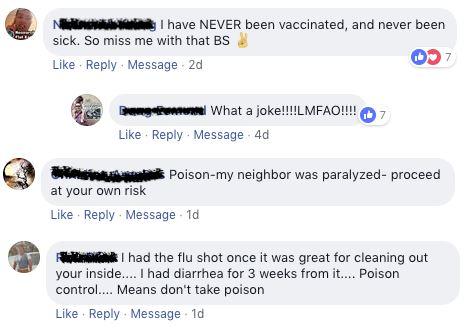
These are just a few of many similar comments. I don’t know these people and they don’t know me or our business. They had no qualms about posting boastfully derogatory, pot-stirring statements. It’s a picture of a pharmacist (ME!), and the course they chose was not to ask a question (“I had a neighbor who says she had a bad reaction, could that have been from the flu shot?”) or try to open discussion (“If I’ve never gotten sick yet never gotten a vaccine, could you explain that?”) like the true intent of social media. Instead, they were picking a fight.
If you were in public with a group of people and one person spoke like that, the group would at minimum get real awkward real fast. What other outcome do statements like that make, besides jump-starting an argument? Certainly not healthy discussion.
Besides these interesting proclamations and oversharing about someone’s bowel problems, we had a number of people who felt a picture with words was worth a thousand words. They chose to only speak in “memes”, which is crazy to me!
This is one guy on the thread:
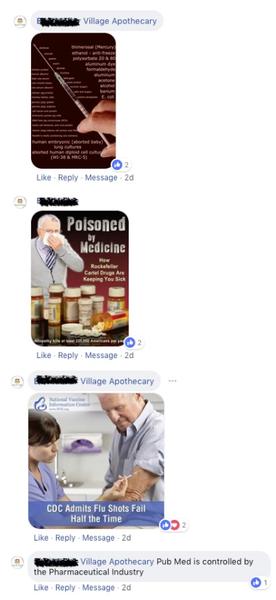
You’ll notice this gent took a break from meme-speak to tell me that PubMed is controlled by Big Pharma. When I asked him, “Who controls the natural products industry?” with a link to our mega-corporations blog, he then got stuck in a new meme-loop.
It also should be noted again that NONE of these people are our customers. Zero.
Why do some people post memes? What’s the point of it? I got tired of it pretty quickly and directly asked someone:
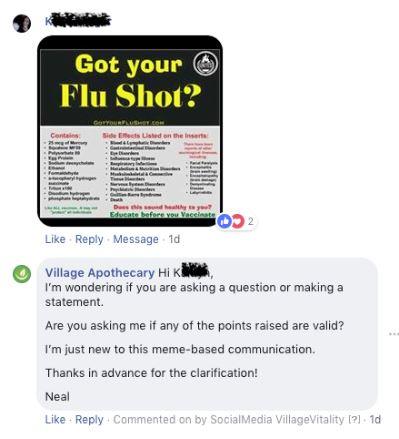
You readers know I’m a wise guy. I’m not going to be mature when presented with such an easy opportunity to stoop to a low level. I had too much fun with some of the people, asking one meme-speaker if we were playing Pictionary. I’m in therapy, ok?
I’m not new to the internet. Don’t people know memes are meant to be shared? To achieve their purpose, memes often contain outrageous statements and claims to quickly gather attention. I’m not crazy, right?
I did try to build bridges, though. I have a theory, one which I’ll share a bit later in this rant, that compels me to volley these time bombs around a bit.
For one, It’s a good opportunity for me, as a pharmacist, to address concerns that are out there. These people aren’t my patients, but I figured I could try to gently move the needle a little bit on their perception of the flu shots.
One woman posted this meme:
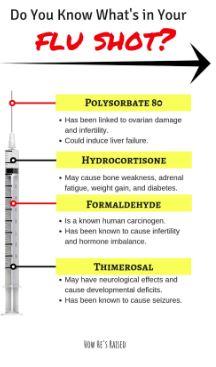
I took the time to explain that those ingredients aren’t harmful. Polysorbate-80 is literally in everything, especially cosmetics and lotions. Hydrocortisone and formaldehyde, though they sound horrible, are actually made by the human body on a daily basis in quantities 100x what would be present in vaccines. And if thimerosal is a problem for you personally (it shouldn’t be), then you could always get the preservative-free flu shot.
Most importantly, I told her that the CDC has a list of what actual ingredients are in all vaccines. To which she replied in disbelief. (Here’s the link in case you were interested)
Here’s my point: Someone engaged in an argument put faith in a meme without even knowing a verified, reputable, and complete source of truth even existed.
A few people posted their memes about ingredients:

This particular gentleman was using this as his proof that vaccines are bad. His contribution was this graphic, though riddled with falsehoods.
I normally don’t pay attention to such memes as I know they are sensationalist garbage, but I read through this one. Aborted human diploid cells. Human embryonic (aborted baby) lung cultures. An adult read this and said, yes, this is horrible stuff I agree with it. Then they SAVED IT TO THEIR OWN COMPUTERS SO THEY COULD SHARE IT LATER.
Then there are the memes about what the flu shots will actually do (or not):
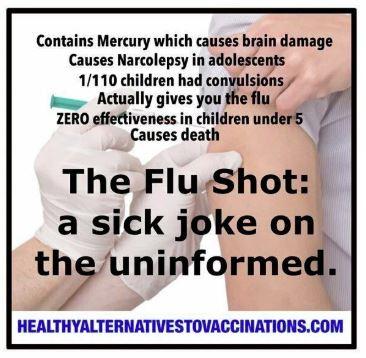
This would be funny if it weren’t dangerous.
You’ll notice something special about this meme. “A sick joke on the uninformed.”
Imagine saying to a room full of doctors, “Flu shots cause narcolepsy in adults and it actually gives you the flu with ZERO effectiveness in children under 5.” If you were nice, they would try to calmly explain why that isn’t true. Since it’s 2018, most of them would raise eyebrows and not engage. Before the internet, they’d do their duty and try to walk you through it. If you were a bit belligerent, though, they’d probably end up saying that you are – wait for it – uninformed. Which is 100% true, by the way.
Language is a powerful thing. This meme uses a “strike first” mentality; people who promote such points ARE uninformed, but instead are using it as a weapon against people with a more informed stance. “No, YOU’RE the poopy doo doo head!” “No puppet! You’re the puppet!”
In one of the threads-gone-wild, a pro-vaxxer (see, there are sides to this debate – us vs them) posted their own meme, to which the original gangster called her a “troll.” Strike first. Flip the script.
What Happened To Satire?
Literally, none of the memes that were shown should be posted for any reason except their comedy effect. Instead, people use these blatant propaganda pieces riddled with lies as Exhibit A to their argument and belief system.
We were one step away from someone posting this as if it were true:

This is obviously satire, by the way. See how easy it is to look legitimate?
I’m an original internet “troll”, being of the generation with an analog childhood and digital adolescence. At the time, a troll was someone who would just start controversy to get people riled. Today, it seems as it has a more violent and hurtful goal. “Back in my day” when we’d post insane stuff, it would be more like the image above. Most of us were just being silly. We’d post stuff like memes in chat rooms satirically or ironically. It felt like most people were in on the joke.
Now, though, the troll isn’t just a pot-stirrer, but a combative, angry, hate-poster. For some, it feels like this is an acceptable method of communication.
I Haven’t Missed Social Media
I’ve been chatting this experience up in my real-life social circles. Some level-headed people said to me, “Well what do you expect?”
It’s sad to me that this is the new norm for discourse between two fellow humans. This experience taught me a lot.
You see, I was one of the lucky ones to get out. I am a #DeleteFacebook hipster – I did it before it was cool. I abandoned Facebook… how long ago now? Hmmm…. How long has Trump been president? Oh yeah, almost exactly 2 years ago.
Like so many of you, I was actively involved in political BS with random people who I was once loosely connected to and their friends whom I’ve never met. VERY shortly after the election, I deleted my Facebook accounts and have had very little Facebook time. For the most part, our staff manage the stores’ accounts.
Within hours, it felt, a sense of anxiety, anger, and frustration was completely gone. Imagine you spend a week eating only chocolate chip cookies and full-sugar soda, then start eating normally again. Not that I have done that (a few days maybe, not a week!).
To be dragged into it brings back old memories, odd horrible physical sensations, and a new perspective.
The Social Media Reality
I used real-life examples from a recent thread to paint a picture of what happens these days on social media.
This is the reality that is social media:
- People act brazenly and speak to each other outside norms of civility
- Some don’t want to discuss, they just want to shout their point, throw in ear plugs and cross their arms in front of their chest.
- They are boastful about their positions, making it easy for them to identify other like-minded individuals and further justify their mindset. All topics become partisan team-sports, with the divides growing larger in the echo-chambers online.
- People speak in memes. They see them, get that dopamine rush from agreeing with the mindset, and use it as a form of communication.
- People don’t realize that the facts and their “facts” are easily verifiable, and there are reputable sites that can provide them this information. The internet literally has ALL of the information, yet theirs is coming from unvetted clickbait.
- People change the language around. The trolls call other trolls. The misinformed call experts uninformed.
In the 2 years since I’ve been gone, I see how much worse it has gotten. And it is all intentional.
The real social media reality is that the social media machine wants this controversy.
The social media algorithms – systems designed by our fellow man – is meant to keep people on page and engaged with the content. This allows the platforms to charge oodles and oodles to advertisers to get in front of billions of people who spend hours a day scrolling along.
What have studies shown? It’s bad news that gets spread quicker. We knew that, didn’t we?
More importantly, positivity from “friends” is as powerful. I put friends in quotes because we trust strangers that say good things about things we’re interested in. These “friends” are just people we haven’t learned to not trust yet. Reviews, testimonials, social media “influencers”, all strangers whose credibility is only discerned in the few sentences we’ve read from them, not the quality of the people they are (they could be jerks!) or the real life relationship we have to them (we have none).
I’m one such social influencer, right? Many of you know me just from the web. There are 1000s of people just like me. Health experts sharing their “expertise” online. Quotes because some of them are actively misinforming people, as we’ve said ad nauseum.
I try to be authentic and trustworthy. In real life, I’m one of the oldest “social influencers.” Pharmacists have been among the most trusted professions for 100s of years. In store, people see my eyes, hear my words, and see my actions and can deem my advice trustworthy. We try to replicate this in-store experience online, and it’s a lot of work. But there’s a faster way…
Troll Feeding and Chain Smoking
To my central thesis…
There’s a reason I “feed the trolls”: for every brazen user who feels empowered to plaster propaganda and retreat from real discussion, there are 10 who are reading but not engaging.
I liken social media influence to smoking.
Do you know that we could practically eliminate the number of lifetime smokers by simply reducing the amount of nicotine and addictive compounds per cigarette? No need for pictures of diseased lungs or people with trach tubes, one quick legislative change would reduce smoking practically overnight.
You see, people don’t start out as chain-smokers. They start casually, smoking occasionally. It’s the system that hooks them in and intensifies the addiction. A difficult one to break.
Exposure to misinformation is the same. Otherwise intelligent people, if exposed to bits and pieces of misinformation frequently enough, will have shifts in their beliefs.
I hear it all day long:
- “I’ve heard that flu shots are bad…”
- “I’ve heard you get sick from the flu shot?”
- “I heard the ingredients are harmful.”
Where did they hear this from? Did they hear it from their doctor? From the CDC? From their pharmacist?
I’m guessing a majority of people’s opinions on topics are swayed by social influences. And not even from conversations they are directly participating in, but the constant exposure to ideas and bits of information they are not themselves familiar with from various sources over time.
If one guy in a room full of 30 people is in the corner talking about aliens coming tonight, they’re crazy. If 10 people start talking about it, you might start looking at the sky.
So I try to engage some of the trolls. If someone says something combative and kinda crazy, there’s a good chance a reader of our posts have heard that before. It may even sound plausible to them. I want to respond so THOSE people can see the proper responses to the misinformation. To dilute the pool of lies and try to bring some balance to the force.
Besides this counterbalance function, a big part of me feels sorry for the “troll.”
Empathy For The Troll
It is understandable why so many take this anti-establishment position. They don’t trust Big Pharma. There’s plenty of evidence that they use their financial power to exert control over regulators. They’ve been caught suppressing data – important stuff. They influence the prescribers with money and fame.
The scientific community shares some blame. There is an undercurrent of “publish or perish”; researchers feel compelled to get their data out, even if it is poor quality, or the funding will dry up. As a result, we have a sea of trash science we have to wade through. Some have learned how to exploit the weakness in literature and have turned it into a system to legitimize their products. Natural products manufacturers fund research groups to produce data that supports their product or shows superiority against competitors, pay to have them published in low-tier journals, then reference it in their marketing.
Our information system IS broken.
That’s a problem. The real problem is that many of us act like children. I said it. I’m standing by it.
The WHOLE system isn’t REALLY broken. In fact, most of us are trying really hard with what we have. It takes an adult to understand that. To not throw the baby out with the bathwater.
It takes an adult to understand life isn’t black and white.
It takes an adult to understand everything carries risk.
It takes an adult to understand nothing is perfect. Nothing will work 100%. You can do everything right and still fail.
It takes an adult to understand everything is constantly changing, especially medicine. It is an evolving practice. What’s good today may not be tomorrow.
It takes an adult to fully engage with the world and see everything for what it is and accept that, then work with it.
Most importantly, it takes an adult to identify one’s own hypocrisy.
So, I do have empathy for the troll. They are frustrated. We live in a weird time. They see the system is broken and have come up with their own way to navigate.
The problem is they aren’t doing so in a consistent manner. They aren’t applying the same standards they hold to Big Pharma to the blogs and sources of (mis)information. You can’t cry “financial conflict of interest!” at Pharmaceutical companies and be completely cool with literally everything else in our society, but especially natural products-related propaganda. You can’t point out the corruption in the scientific community without acknowledging the facts they are using to justify a position don’t come from a vacuum.
It’s easy for people to use memes to increase their understanding. To build their worldview from transient conversations with strangers on the internet. It feels better to have a sexy answer – a secret that the mainstream won’t let you know – than it is to follow the plain, boring, yet trusted advice. It’s sexy, it’s funny, and it feels good.
Cleaning Up The Social Oil Spill
And of course this comes out into real life. We see it daily – discourse in America has changed for the worse.
We have the Internet – all the knowledge at our fingertips – but we don’t know how to navigate it. We look to trusted experts, not for advice, but to confirm our already loosely held beliefs. Anything in conflict with that is not trustworthy.
The social media culture creates tension, anxiety, depression, animosity, and more. We’re hyped up.
So what can we do?
First, legalize marijuana. Everyone needs a few brownies and I think we’ll be better off.
Besides that miracle never coming true, we have to fully understand all of the factors, influences, biases, and systems in play. I’ll encourage you to do some google searches for “social media misinformation,” “social media psychology,” “how marketing uses psychology to influence us,” and even “the wellness-industrial complex.”
Can you pick out trustworthy articles? Can you see the slant and bias in everything you read?
We tried to help people Become Better Researchers, so check that article again.
We can unplug. Remove ourselves from the social media platforms that are most cancerous. But we like to see pictures of our family and get updates from people who truly are close to us. Plus, we can’t fix the system without properly engaging in it.
We can block or mute people or pages on social media. I’m not suggesting blocking people of differing opinions, but instead blocking those who are not contributing positively to discussion or are resistant to healthy debate. Blocking the former creates echo chambers where our own beliefs get amplified and worsen.
I’ve got a strategy to get through it while simultaneously getting a higher quality information stream.
Getting Good Information
Thanks to Patricia for helping me with this section 🙂
We are exposed to so much misinformation. It isn’t hyperbole to say bad information grossly outweighs good information.
Good information is boring. Misinformation is not. It’s sexy. It’s shareable. It plays on fears and doubts. It’s easier to consume. It’s contagious; it’s viral.
Step 1: We must understand that we will see more misinformation. AND it will be more attractive to our primal psychological drives to believe, even just slightly, bad information.
What and who we believe is based on what I’m calling our “trust threshold.” For me, a medical practitioner with 15 years of experience, my trust threshold on vaccines is crossed by the CDC. Lifelong researchers dedicated to the protection of society against disease, whose job it is to comb through ALL the research, tease out the trash, and make recommendations based on what we know.
For some people, they feel the CDC is a government body that is corrupt and spreading poison. What criteria are they creating for THEIR trust threshold? What standards does someone have to meet to be reputable enough to make an informed decision? IMPORTANT POINT HERE: Are those standards being applied consistently by the CDC to whomever they trust?
Step 2: Figure out what your trust threshold is. What are the standards for excellent information for you? Who meets this for you? Are you keeping it real by applying those standards consistently?
Please note, that Step 1 – the misinformation and Step 2 – The trust threshold should not be emotional. It should be based on facts and figures, not faith and fears.
There is plenty of evidence that there have been incidents of corruption with the FDA. Does that mean the WHOLE organization is corrupt? Does that mean we shouldn’t trust the CDC or their recommendations? Are we throwing the baby out with the bathwater?
With these in mind, we consume our media. We build trust by agreeing with the persona and what they are saying. We follow their advice, we incorporate their knowledge (deservedly or not). But we’ve never met these people. These people – the “experts”, the reviewers, the people on social media – are strangers.
I’m one of those strangers. I’ve said it before: Don’t trust me implicitly. Do your research, because, like everyone else, I have an axe to grind.
I don’t hide mine, though. For the sake of addressing any hypocrisy, let’s review! I want a sustainable business providing a no BS approach to supplements and wellness. I don’t need to be rich, I just need the business to have traction. Regular growth. Healthy margins. And a great team to help me do it. I’ve been very lucky so far. I truly just want a healthy, long-term business and time to spend with the people I care most about.
Back to it… What are the motivations of the people you trust most?
Here’s my final suggestion: perhaps it’s best to consume the information on a global scale – from the internet, podcasts, magazines, TV, etc – but then go to your local, trusted experts.
I can read all day what the best car to buy is. I’m going to ask my local mechanic what he thinks since he works in the stuff all day. He’s probably super passionate about cars, so he could help me validate what I’ve seen.
Step 3: Read globally, decide locally. Consume your media, but don’t attach to it. Don’t let it become “who you are” quite yet. Use your team of local experts to help guide you and point you to even better resources within their trust thresholds. Have them help you judge YOUR trust threshold. Perhaps it’s not high enough.
Back to the beginning. We started this by talking about the social responses to flu vaccines. Who do I trust as a reader of Neal’s pharmacy’s Facebook page? Do I trust the healthcare practitioner who learns from and trusts the CDC, or do I look to memes and blog pages of people selling stuff (products, ads, and even attention)?
Time To Take On The Real Enemy
This rant was a little preachy. The social-media-is-cancer argument has been done so much, I wanted to give a slightly different take.
Here’s the big one… one last bit of preach:
The enemy is not someone on the pro-vaxx or anti-vaxx team. Not someone on the Red political team or the Blue team. Not people of different races or countries.
The enemy is the grave.
Changing your perspective from us vs them to us vs the grave is the radical shift we need. If the enemy is the grave, living life fully is the polar opposite and how we “win.”
Live mindfully. Help others live their best lives. Stop those who actively stand in the way of that for others. Don’t sit idle if you see this happening.
Empathy is a rare gift.
Be more present. Practice compassion. Give the gift of empathy regularly.
Just trying to keep it real…

Neal Smoller, PharmD
Owner, Pharmacist, Big Mouth



